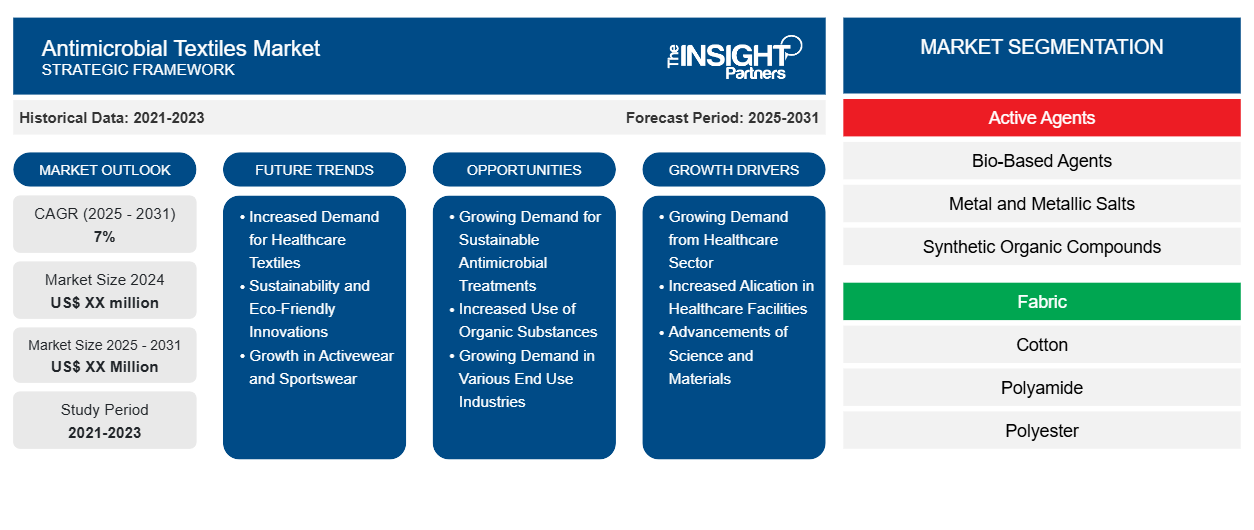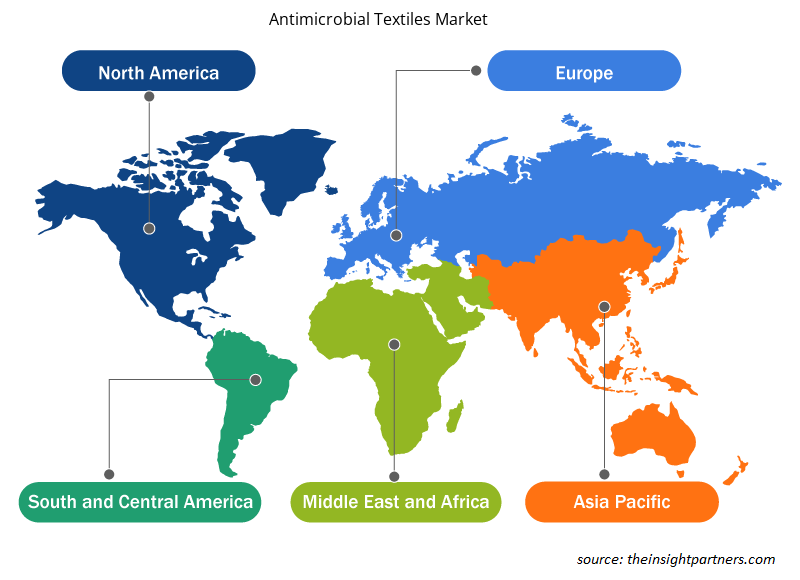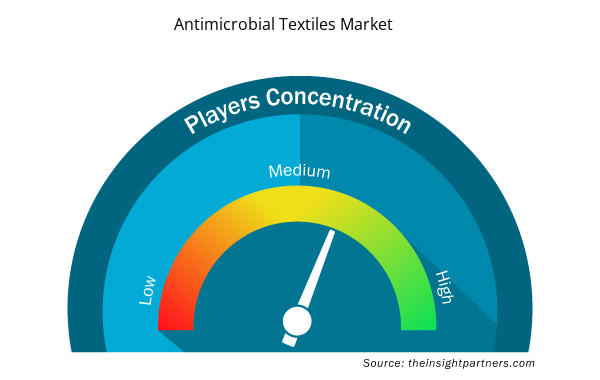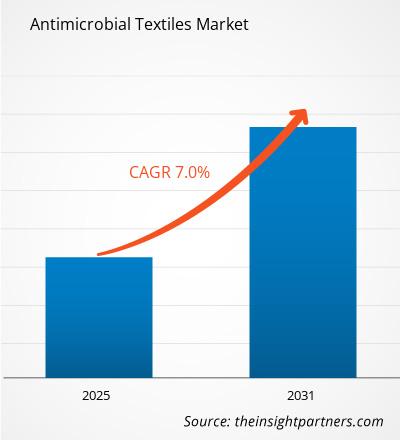The Antimicrobial Textiles Market is expected to register a CAGR of 7% from 2025 to 2031, with a market size expanding from US$ XX million in 2024 to US$ XX Million by 2031.
The report is segmented by Active Agents (Bio-Based Agents, Metal and Metallic Salts, and Synthetic Organic Compounds). The report further presents analysis based on, Fabric (Cotton, Polyamide, Polyester, and Others). Based on Application report is segmented into (Medical Textiles, Apparel, Home Textiles, Commercial Textiles, Industrial Textiles, and Others). The global analysis is further broken-down at regional level and major countries. The Report Offers the Value in USD for the above analysis and segments.
Purpose of the Report
The report Antimicrobial Textiles Market by The Insight Partners aims to describe the present landscape and future growth, top driving factors, challenges, and opportunities. This will provide insights to various business stakeholders, such as:
- Technology Providers/Manufacturers: To understand the evolving market dynamics and know the potential growth opportunities, enabling them to make informed strategic decisions.
- Investors: To conduct a comprehensive trend analysis regarding the market growth rate, market financial projections, and opportunities that exist across the value chain.
- Regulatory bodies: To regulate policies and police activities in the market with the aim of minimizing abuse, preserving investor trust and confidence, and upholding the integrity and stability of the market.
Antimicrobial Textiles Market Segmentation
Active Agents
- Bio-Based Agents
- Metal and Metallic Salts
- Synthetic Organic Compounds
Fabric
- Cotton
- Polyamide
- Polyester
Customize This Report To Suit Your Requirement
You will get customization on any report - free of charge - including parts of this report, or country-level analysis, Excel Data pack, as well as avail great offers and discounts for start-ups & universities
Antimicrobial Textiles Market: Strategic Insights

- Get Top Key Market Trends of this report.This FREE sample will include data analysis, ranging from market trends to estimates and forecasts.
Antimicrobial Textiles Market Growth Drivers
- Growing Demand from Healthcare Sector: Rising demand in the healthcare industry is arguably one of the crucial drivers shaping the market for antimicrobial textiles. Textiles capable of controlling or preventing the transmission of microbials have increasingly come under demand as healthcare institutions have started putting greater emphasis on patient safety and infection prevention measures. There is an increasing utilization of antimicrobial textiles in the making of curtains, beddings, uniforms, and other medical products such as wall and floor coverings of hospitals, which helps to enhance hygiene levels.
- Increased Alication in Healthcare Facilities: Hospital Acquired Infections (HAIs) pose substantial challenges for healthcare providers, and as such, hospitals endeavor to address this problem by spearheading the design and incorporation of new textiles. They form part of the general infection control practices because such fabrics will help prevent the transmission of diseases which have pathogenic microorganisms. This better patient and safety in the work environment is stated to be the reason behind the high usage of such materials in health care facilities.
- Advancements of Science and Materials: In addition to that, gradually with the course of time textile engineering expansion is facilitating the introduction of antimicrobial finishes. Today’s fabrics can also provide effective barrier against bacteria, fungi and even viruses for a considerable length of time which is paramount in the health care. With the advancements of science and materials, the funds allocated for studies are increasing as well as the types of accomplished antimicrobial fabrics without lagging behind the market requirements.
Antimicrobial Textiles Market Future Trends
- Increased Demand for Healthcare Textiles: The antimicrobial textiles market is seeing a surge in demand within the healthcare sector due to the growing need for infection control. Products like hospital linens, gowns, and patient-care textiles are being enhanced with antimicrobial properties to reduce the spread of harmful bacteria, fungi, and viruses, promoting hygiene and patient safety.
- Sustainability and Eco-Friendly Innovations: Sustainability trends are shaping the antimicrobial textiles market, with a growing focus on eco-friendly and biodegradable materials. Manufacturers are adopting natural antimicrobial agents like silver, copper, and plant-based solutions to create textiles that are both effective against microbes and environmentally sustainable, meeting consumer demand for responsible products in the fashion and home textile industries.
- Growth in Activewear and Sportswear: The rise of activewear and sportswear is boosting the antimicrobial textiles market, as consumers seek odor-resistant, moisture-wicking, and bacteria-fighting fabric for athletic use. Antimicrobial-treated fabrics help to reduce body odors and skin irritations, offering comfort and hygiene for athletes, leading to the incorporation of these textiles in fitness apparel, socks, and sports gear.
Antimicrobial Textiles Market Opportunities
- Growing Demand for Sustainable Antimicrobial Treatments: The increase in requirement for green antimicrobial control methods is expected to offer considerable opportunities for growth in the antimicrobials in textiles market. Since the consumers pay a lot of attention to the environment, it is expected that there will be a high tendency of using green textiles. Hence, manufacturers are pushed to come out with antimicrobial agents that are effective and at the same time less harmful to the environment.
- Increased Use of Organic Substances: Environmental friendly treatments normally make use of organic or bio-based substances which help lessen the effect of textile manufacturing on the environment. These alternatives are not only ideal in terms of meeting standards but also appropriate and more appealing to the green consumers. Thus, companies investing profits in the development of environmentally effective antimicrobial technologies can afford to explore this market niche and increase their appeal.
- Growing Demand in Various End Use Industries: Also, the interest in eco friendly antimicrobial textiles extends beyond the healthcare sector to fashion, home textiles and activewear. As industries try to position themselves from one another, using these green antimicrobials in products can be one of the ways of gaining the edge. This trend fosters and healthy competition and the quest for new and better green technology.
Antimicrobial Textiles Market Regional Insights
The regional trends and factors influencing the Antimicrobial Textiles Market throughout the forecast period have been thoroughly explained by the analysts at Insight Partners. This section also discusses Antimicrobial Textiles Market segments and geography across North America, Europe, Asia Pacific, Middle East and Africa, and South and Central America.

- Get the Regional Specific Data for Antimicrobial Textiles Market
Antimicrobial Textiles Market Report Scope
| Report Attribute | Details |
|---|---|
| Market size in 2024 | US$ XX million |
| Market Size by 2031 | US$ XX Million |
| Global CAGR (2025 - 2031) | 7% |
| Historical Data | 2021-2023 |
| Forecast period | 2025-2031 |
| Segments Covered |
By Active Agents
|
| Regions and Countries Covered | North America
|
| Market leaders and key company profiles |
Antimicrobial Textiles Market Players Density: Understanding Its Impact on Business Dynamics
The Antimicrobial Textiles Market market is growing rapidly, driven by increasing end-user demand due to factors such as evolving consumer preferences, technological advancements, and greater awareness of the product's benefits. As demand rises, businesses are expanding their offerings, innovating to meet consumer needs, and capitalizing on emerging trends, which further fuels market growth.
Market players density refers to the distribution of firms or companies operating within a particular market or industry. It indicates how many competitors (market players) are present in a given market space relative to its size or total market value.
Major Companies operating in the Antimicrobial Textiles Market are:
- The Aditya Birla Group
- Fuji Chemical Industries
- Herculite
- Indorama Ventures Public Company Limited
- Kolon Industries
Disclaimer: The companies listed above are not ranked in any particular order.

- Get the Antimicrobial Textiles Market top key players overview
Key Selling Points
- Comprehensive Coverage: The report comprehensively covers the analysis of products, services, types, and end users of the Antimicrobial Textiles Market, providing a holistic landscape.
- Expert Analysis: The report is compiled based on the in-depth understanding of industry experts and analysts.
- Up-to-date Information: The report assures business relevance due to its coverage of recent information and data trends.
- Customization Options: This report can be customized to cater to specific client requirements and suit the business strategies aptly.
The research report on the Antimicrobial Textiles Market can, therefore, help spearhead the trail of decoding and understanding the industry scenario and growth prospects. Although there can be a few valid concerns, the overall benefits of this report tend to outweigh the disadvantages.
- Historical Analysis (2 Years), Base Year, Forecast (7 Years) with CAGR
- PEST and SWOT Analysis
- Market Size Value / Volume - Global, Regional, Country
- Industry and Competitive Landscape
- Excel Dataset


- Fill Finish Manufacturing Market
- Hair Wig Market
- Print Management Software Market
- Pressure Vessel Composite Materials Market
- Oxy-fuel Combustion Technology Market
- Visualization and 3D Rendering Software Market
- Single Pair Ethernet Market
- Smart Water Metering Market
- High Speed Cable Market
- Parking Management Market

Report Coverage
Revenue forecast, Company Analysis, Industry landscape, Growth factors, and Trends

Segment Covered
Active Agents, Fabric, Application

Regional Scope
North America, Europe, Asia Pacific, Middle East & Africa, South & Central America

Country Scope
This text is related
to country scope.
Frequently Asked Questions
#Development of New Antimicrobial Agents is expected to be the key market trends.
Based on geography, Asia Pacific held the largest share of the antimicrobial textiles market.
The Aditya Birla Group, Fuji Chemical Industries, Herculite are some of the key players operating in the antimicrobial textiles market
Based on active agents, metal and metallic salts is expected to witness the fastest growth during the forecast period
The Antimicrobial Textiles Market is estimated to witness a CAGR of 7% from 2023 to 2031
Growing Demand from Healthcare Sector is driving the market growth
Trends and growth analysis reports related to Chemicals and Materials : READ MORE..
- The Aditya Birla Group
- Fuji Chemical Industries
- Herculite, Indorama Ventures Public Company Limited
- Kolon Industries
- Response Fabrics
- Sanitized AG
- Sarex Textile Chemicals
- Toyobo Co
- Vardhman Holdings Limited
- Milliken & Company

 Get Free Sample For
Get Free Sample For